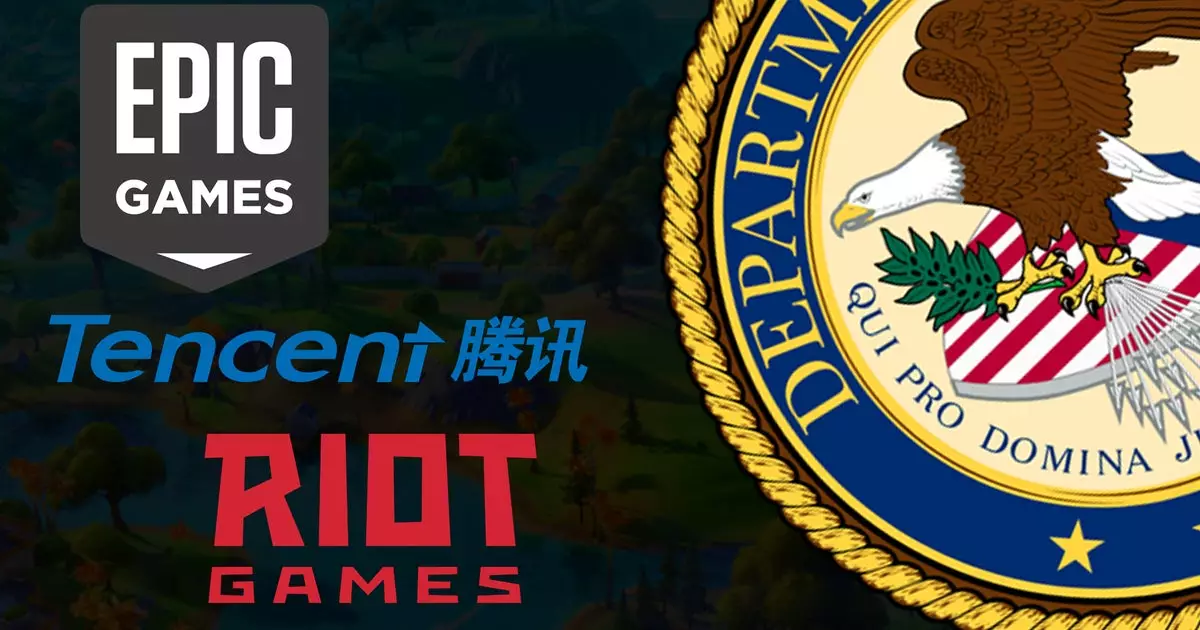The recent resignations of two board members from Epic Games have stirred significant conversation surrounding corporate governance and antitrust regulations in the gaming sector. While the unfolding story primarily highlights Epic’s entanglement with Tencent, the implications of these developments extend far beyond the two companies involved. As the U.S. Department of Justice (DoJ) investigates potential violations of antitrust laws, it casts a spotlight on how regulations aim to prevent market monopolization and promote fair competition, especially in industries dominated by few giants.
Epic Games, known for its flagship product—the Unreal Engine—has been under scrutiny due to its association with Tencent, a Chinese conglomerate that holds a significant minority stake in the company. The DoJ’s investigation focused particularly on the dual role of Tencent’s directors within Epic’s board. The appointed directors, Ben Feder and David Wallerstein, held influential positions within Tencent, leading to questions about whether their presence on the board posed a conflict of interest. The federal agency announced the departures of Feder and Wallerstein, asserting that their roles could compromise the competitive integrity of both companies.
This situation can be likened to allowing a representative from Pepsi to participate in critical decision-making at Coca-Cola. In essence, the government deemed that the significant involvement of Tencent—as the majority shareholder of rival Riot Games—carries the potential for anticompetitive behavior. This threat is underscored by the legal framework established under the Clayton Act, which explicitly prohibits individuals from serving on boards of competing companies to avoid any undue influence or conflicts of interest.
In light of these developments, the resignations of Feder and Wallerstein can be seen as a strategic retreat to alleviate potential backlash against both Epic and Tencent. Their departures were confirmed by Epic Games in an email correspondence with Bloomberg, which suggested a proactive attempt to distance the company from any legal ramifications stemming from antitrust violations. Moreover, the DoJ clarified that no party had admitted liability during the investigation, yet it became evident that changes were necessary to comply with legal expectations.
Tencent’s agreement to amend its shareholder agreement with Epic represents a significant move to reinforce corporate governance norms. With this new policy, Tencent will no longer be allowed to appoint directors to Epic’s board in the future, effectively eliminating potential conflicts of interest. This change not only serves to protect Epic but also reflects an increasingly watchful regulatory environment that is keen to promote competitive fairness in the marketplace.
The implications of these antitrust regulations and their enforcement stretch across the broader landscape of the video game industry. Historical examples reveal that big corporations in this realm have faced scrutiny over their business practices. Valve, for instance, encountered an antitrust lawsuit, while Microsoft was subjected to analysis during its successful acquisition of Activision Blizzard. Such high-profile inspections underscore the government’s commitment to maintaining competitive markets and preventing monopolistic behaviors.
The gaming industry, characterized by rapid technological evolution and consumer demand, is particularly susceptible to monopolistic tendencies. Companies must navigate an intricate balance of growth and competitive integrity, ensuring that their business practices align with regulatory expectations. Failure to do so can not only lead to legal repercussions but also damage consumer trust.
The resignations at Epic Games serve as a reminder of the complexities surrounding corporate governance in an era marked by increasing government oversight. As regulators continue to monitor the activities of major players in the gaming industry, companies must prioritize compliance and ethical practices. The relationship between corporations and government remains pivotal in shaping market dynamics. Through vigilance and adherence to antitrust laws, the gaming sector can foster a healthier competitive environment that ultimately benefits consumers and staves off monopolistic practices. This scenario underscores the need for companies to maintain transparency, evoking a shared responsibility among stakeholders to uphold market integrity in the face of evolving regulations.


Leave a Reply